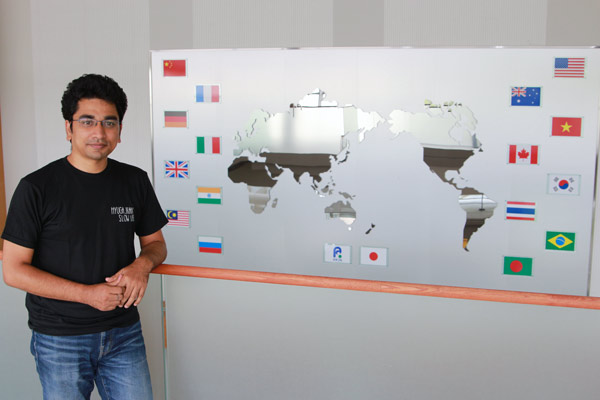Oct. 3, 2023
Plant-derived medical chemicals
Amit Rai, Research Scientist
Please describe your role.
I work as a research scientist in the Metabolomics Research Group under the leadership of Kazuki Saito, who is also the director of the RIKEN Center for Sustainable Resource Science. In my present role, I study Japanese plants, such as Panax japonicus and Glycyrrhiza uralensis among others, to understand why and how these plants synthesize chemicals with medicinal properties.
Please describe your current research.
My interest lies in delving into the biosynthesis and regulation of a group of medicinal plant-derived chemicals known as phytochemicals. These phytochemicals are used in drugs that treat various diseases, including cancer, hypertension and non-insulin dependent diabetes.
Specifically, I investigate the biosynthesis of bioactive metabolites, including alkaloids. My aim is to develop strategies to enhance their production and achieve sustainable supplies. As these phytochemicals are essential to the plant stress response, understanding their biosynthesis pathways and regulatory mechanisms is also vital to cultivating next-generation crops with heightened nutritional value, increased production rates and enhanced resistance to pests and environmental fluctuations.
What advanced technologies do you use at RIKEN?
One important technology that is very useful is a platform my group uses for identifying new metabolites using highly sophisticated and sensitive mass spectrometry instruments.

Why did you join RIKEN?
While working at Chiba University, I collaborated with members of the Metabolomics Research Group. My interactions allowed me to see RIKEN’s capabilities in terms of performing big-data research. That’s how I heard of this position, which is focused on genomics and multiomics with the aim of enhancing phytochemical production.
What has been your most memorable experience at RIKEN?
I received a Letter of Appreciation from the president of RIKEN for my research in March 2022. That was a memorable moment for me.
What excites you the most about your research?
Today, thanks to advances in technology, we have gained access to thousands of plant genomes that represent diverse lineages. These give us insight into their mechanisms.
How did you become interested in your field of research?
Coming from a family of farmers in India, I was fortunate to have my grandfather to teach me about the fundamentals of cultivating and harvesting crops.
While his explanations were primarily rooted in personal experience, I found myself grasping the underlying scientific principles as I delved into my studies.
Then, after my undergraduate and doctoral studies, I had the privilege of joining Kazuki Saito’s group while he was at Chiba University in Tokyo, Japan. This invaluable opportunity granted me access to an extensive collection of Japanese medicinal plants.
I was intrigued that medicinal plants are a major source of health worldwide, and yet little is known about their evolution, biosynthesis and regulation of phytochemicals, nor the mechanisms behind their medicinal properties. Advances in genomics and metabolomics further helped me to ask difficult questions.
Rate this article

